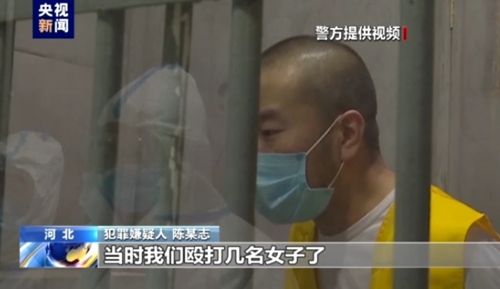
Chen Jizhi, the main suspect of Tangshan restaurant assault case on June 10 and other 28 defendants were publicly prosecuted, the procuratorate of North China's Hebei Province announced on Monday. Photo:CCTV
A total of 28 people, including the main suspect Chen Jizhi, were prosecuted on Monday for involving in a
cruel barbecue restaurant assault in Tangshan, North China's Hebei Province, following 80 days of investigation under great public expectations, as there was solid evidence of their crimes.
On the same day, the procuratorate authorities of Hebei released a separate statement, in which they said that they also filed cases on 15 people holding public positions, eight of whom were taken into custody for their suspected abuse of power, corruption and offering a "protection umbrella" for criminal gangs.
The Tangshan assault occurred at a barbecue restaurant on June 10 after midnight, when four women were assaulted and attacked by a group of men, which prompted widespread condemnation and triggered a heated discussion about whether criminal gangs were involved and why the attackers were so unscrupulous.
Social media echoed with cheers immediately after the phased probe result was released on Monday morning. The hashtag "protection umbrella of the main suspect in Tangshan assault case being investigated" was trending on top of social media platform Sina Weibo, which had generated over 540 million views as of press time. Netizens welcomed the authorities' investigation. "Justice eventually comes," one netizen wrote.
Observers said Monday's announcement responded to the people's long-awaited expectations for fairness and justice, and also revealed the determination of Tangshan to eradicate organized crime to restore public confidence in a safe China. They believed a fair penalty for those suspects will follow.
With the close cooperation of the Ministry of Public Security, disciplinary authorities in Hebei investigated the suspected organized crimes and protection umbrellas behind Chen's case. Among the 15 people being investigated, eight holding public positions were taken into custody. The initial probe showed they were suspected of involvement in the abuse of power, receiving bribes and bribing others.
Among the eight were Ma Aijun, the deputy head of Tangshan's Lubei district and head of the district's public security bureau, and Hu Bin, head of a police station branch. Six other officials were all in police positions.
Shi Guizhong, the deputy head of the public security department of Hebei Province, said the Tangshan case exposed the shortage of police working mechanisms and their capability in handling cases, and it is a harsh lesson for public security organs.
All public security organs of Hebei will take the chance to optimize police management and the credibility of law enforcement so as to effectively respond to the people's expectations for peace, stability, fairness and justice, Shi noted.
In a comment on the probe, Shen Yi, a professor specializing in cyberspace at Fudan University, told the Global Times that the announcement is encouraging as it responded to public expectations, though it took a long period of time.
Netizens generally believe the Tangshan assault was an accidental, extreme case that affected the country's public confidence toward a safe China. Their reaction to Monday's probe result was rational, which signifies the strong belief in judicial and government credibility among the Chinese public, Shen noted.
Next, Langfang's Guangyang district people's court will handle the public prosecution against Chen and relevant defendants.
The procuratorate organ revealed that Chen had gathered other members, who gradually became an organized gang in recent years. Since 2012, Chen and others stayed together for a long time. They were involved in 11 separate criminal cases, including the illegal custody of others, provoking affrays, intentionally injuring others, and opening a casino for gambling, robbing others, and hiding their criminal records. There were also four administrative violations including provoking troubles. The organized gang was gradually formed with Chen being the main organizer.
The gang committed crimes, oppressed people, and destroyed the local economy and social order, resulting in a bad social influence, the procuratorate authorities said.
On the brutal Tangshan restaurant case, the procuratorate authorities stated in detail that at 2:40 am on June 10, Chen and three colleagues firstly harassed a woman surnamed Wang. Chen beat her up after the woman resisted. Later, six people used chairs, beer bottles and punches to beat up Wang and three of her friends.
Two of the victims were identified as having had slight bodily injuries and the other two suffered minor injuries of Class II level. The procuratorate authorities dismissed online rumors saying that the four victims were sexually assaulted in a small alley, thrown from a building, and run over by a car.
Lü Xiaoquan, a Beijing-based lawyer, told the Global Times that the final sentence will depend on how many and how serious the crimes involved were. Factors such as the nature of the crimes, detailed circumstances and the consequences of the crimes will be considered.
The case now was transferred to a district-level people's court, and such a grass-roots court generally brings in a verdict of fixed-term imprisonment of up to 20 years for multiple crimes. But given the huge and lasting social impact the crime has caused, Lü suggested procuratorate authorities to file a prosecution to the Langfang Intermediate People's Court in the first instance. The lawyer explained that a trial in a higher-level court does not necessarily mean a more severe penalty for the suspects, but shows the authorities place a high value on the case.




